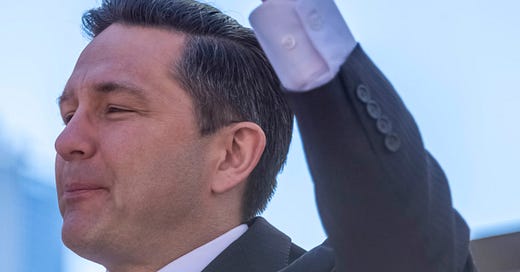Two sides of Pierre Poilievre
My profile of the Conservative leader for L'actualité magazine, presented here in the original English
I wrote this profile of the Conservative leader for the current edition of the French-language newsmagazine L’actualité. Here it is in the original English. (I sometimes write for publication in French, but this time I let the editors translate me.) At the end of the article I’ll add a note about the article’s origin. — pw
I’ve known Pierre Poilievre for 20 years. Or rather, for most of the last 20 years, I thought I knew Pierre Poilievre.
In 2003 I was working at the National Post. One day in my column I briefly made fun of Stockwell Day, the former Canadian Alliance leader who was now the party’s lead critic for foreign affairs under the new leader, Stephen Harper. Except Day preferred to call himself “Shadow minister, foreign affairs.” This sounded grander than “critic for foreign affairs,” and in my column I suggested Day was putting on airs.
I received an email from a political staffer I’d never heard of. Pierre Poilievre was 23 and working in Day’s office. “Thanks for mentioning him,” the young staffer wrote. I liked the instinct: fearless and cheeky.
A few weeks later I met Poilievre in person at Darcy McGee’s, an Irish pub near Parliament. He was friendly, an easy and charming conversationalist.
Over the years that followed, Poilievre and I occasionally chatted. Harper and Peter MacKay built a new united Conservative Party in 2003. Harper led the new party through five election campaigns, including his victories in 2006, 2008 and 2011. Justin Trudeau’s election in 2015 meant a decade in opposition for Conservatives. Poilievre and I would run into each other on Parliament Hill, or at social events. He was one of many sources for my two books about Stephen Harper. A few times we met at La Bottega Nicastro, an Italian lunch counter in the Byward Market, simply to enjoy strong coffee and to gossip about politics. I am not claiming a close relationship. Poilievre clearly knew the staff at Nicastro, whom he would greet warmly, at least as well as he knew me. I probably knew 30 MPs as well as I knew him.
Other journalists had similar access to Poilievre, which is unsurprising because dozens of reporters in Ottawa talk to dozens of MPs and cabinet ministers. Poilievre was unusually intelligent. He was very conservative, but not outside the mainstream of Canadian political thought.
In private he was unfailingly courteous. In 2018 Maclean’s magazine organized the annual Parliamentarian of the Year awards, with MPs themselves voting to recognize colleagues in several categories. Poilievre’s peers selected him as Most Knowledgeable MP. He arrived at the award party a few minutes late, with his wife Anaida and their baby daughter Valentina. He apologized profusely to me for being late.
In public it was often a different story. He can be belligerent, pompous, contemptuous of politicians from other parties. Again, that’s hardly rare. But for years, reporters who knew him often preferred not to interview him, because any recorded conversation with Poilievre would quickly become show business. Political speech always has an element of theatre, but anyone interviewing Poilievre had the disorienting and not entirely pleasant sensation of watching the private man disappear for a few minutes while a persona came out to speak.
At some point the private man disappeared entirely, at least from me. Our last email exchange was in 2020. Since February 2022, when he announced his candidacy for the Conservative Party of Canada leadership, we have not had a conversation. My occasional requests for interviews with the candidate, and then with the leader and likely next Prime Minister of Canada, have been ignored or politely declined by Poilievre’s staff. For this article, I gave his office a choice: I could tell Quebecers what to think about him in the pages of L’actualité — or Poilievre could tell them himself, by sitting for an interview. You’re stuck with me. In November Poilievre and I were on the same Porter flight from Toronto to Ottawa. He seemed not to see me, though he paused in the aisle to chat amiably with the man sitting directly behind me.
I don’t mind. He’s working on winning. Until he wins, he will not relax in public, not once.
The most important thing to remember about Pierre Poilievre — the best explanation for anything he does that might confuse you or seem strange — is that he believes he has no right to lose the next election.
Keep reading with a 7-day free trial
Subscribe to Paul Wells to keep reading this post and get 7 days of free access to the full post archives.




